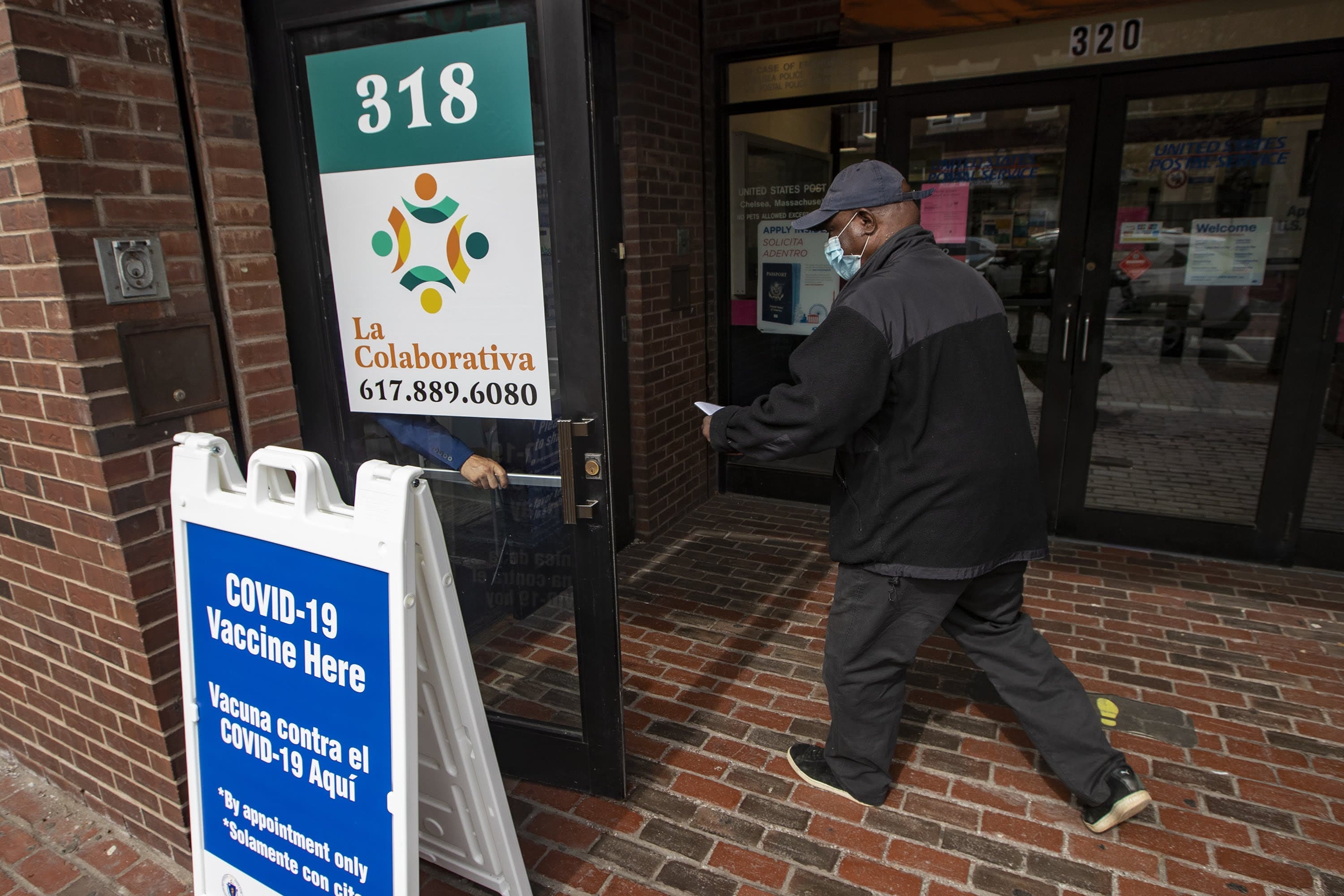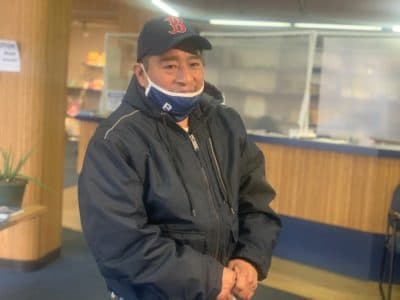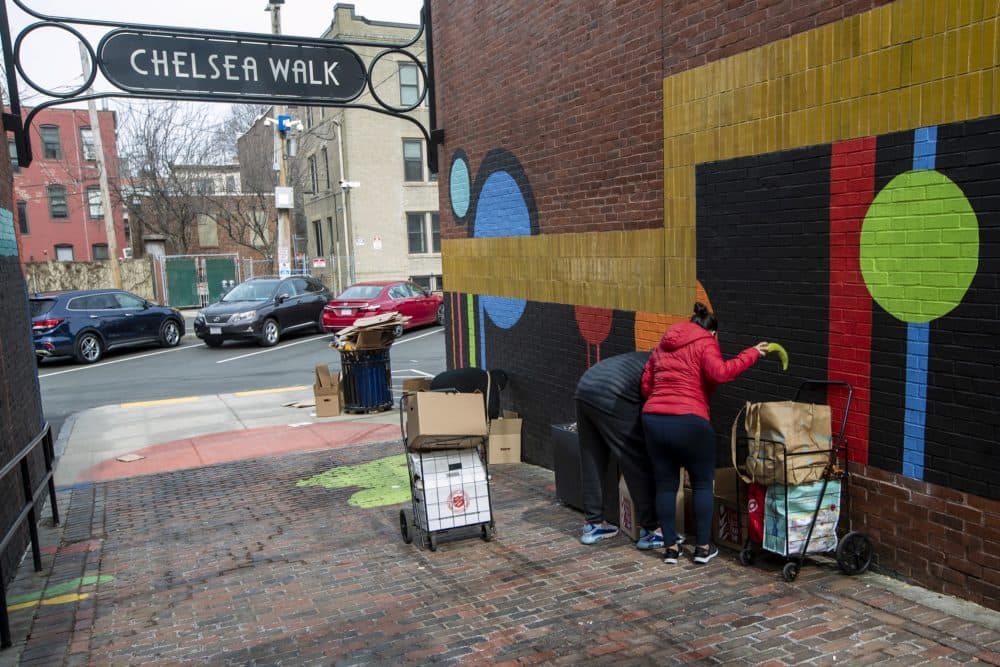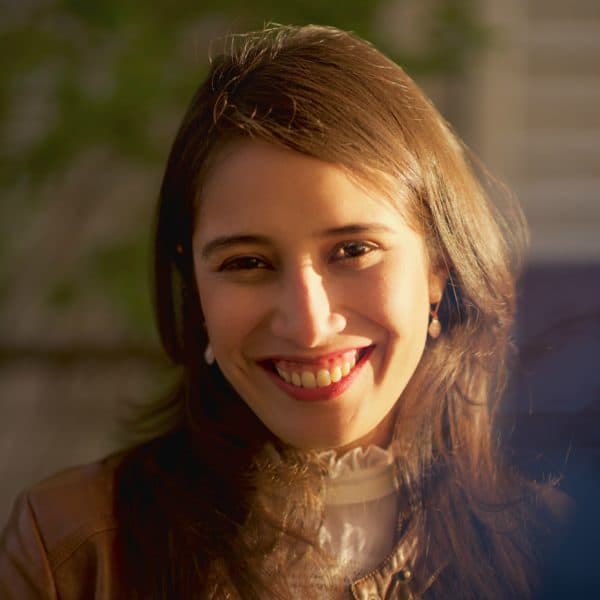Advertisement
Low Vaccination Rates Among Latinos Raise Concerns In Chelsea, Ravaged By The Pandemic

Traducido en español por El Planeta Media.
At the start of the pandemic, Joaquin Lux thought he was dying.
"I have no air," Lux told a reporter in Spanish, as he lay in a hospital bed in Boston.
A year later, the Chelsea resident thanks God he survived COVID-19, but still feels lingering effects. Lux says he feels tired and struggles to breathe when he walks a lot or runs even a little. "I don't feel the same."
Now Lux faces a new challenge: Getting vaccinated.

After walking into a clinic in downtown Chelsea last week, he learned he was not eligible for a shot, despite his lingering health problems and fear of catching the virus again.
"Please let me know when I can qualify," he told the receptionist at the clinic, run by the Chelsea-based nonprofit La Colaborativa.
At 59, Lux was not yet old enough to get the vaccine. But this week he got good news. Three months after the first shots were given in Massachusetts, the state expanded the list of occupations that qualify for the vaccine to include food industry workers like himself. Lux now has an appointment to get vaccinated.
Nor did his job at a sausage-making plant make him eligible as of last week. Even though the state considers food processing an essential service, the clinic told him it was not one of the jobs prioritized for the vaccine. (The state added food service workers to the list of essential occupations eligible for the vaccine earlier this week.)
Advertisement
In April of 2020, WBUR and El Planeta helped identify Chelsea as the epicenter of the outbreak in Massachusetts — before the state started releasing case numbers for every town and city in the state.
Cases in Chelsea have declined from their peak this past winter. But now Chelsea faces a new problem: Low vaccination rates among Latinos, who account for most if of its residents.
Only 11% of the city’s Hispanic residents have been vaccinated, compared to 42% of white residents, according to state data, similar to disparities in other cities across Massachusetts. WBUR found several explanations for the gap.
Who's Prioritized And Who's Not?
Many Chelsea residents work in essential blue-collar jobs where they could potentially be exposed to people carrying the virus. But until this week, the state largely limited vaccines to a handful of professions, like health care workers, first responders, and teachers.
On Monday, the state sharply expanded the list of workers who can get vaccinated — adding jobs like taxi drivers, janitors, cooks and grocery store baggers.

But many essential workers like Lux continue to wait their turn.
Dinanyili Paulino, who helps coordinate aid for people recovering from the pandemic, says a lot more Latinos would have been vaccinated if the state hadn’t waited so long to allow grocery clerks and other essential workers to qualify.
"Why do we have to wait to be a priority if we are [the ones] making sure that this state is still running?" says Paulino, who works for La Colaborativa. "Who do you think that should be sending the fruit to the supermarkets to be on your table?"
In addition, the state also prioritized vaccines for seniors, considered the most vulnerable to dying from the disease. Massachusetts initially offered the vaccine to people in people in congregate care and long-term care facilities and other, such as nursing homes, then people who were 75 and older, then 65, then finally 60 and older this week.
But that decision also made Latinos far less likely to qualify for the vaccine. U.S. Census numbers show white people in Massachusetts are roughly three times more likely than Hispanic residents to be 65 or older.
Vaccine Hesitancy
Many Hispanic residents are also wary about getting vaccinated, even if they qualify.
An NPR Marist Poll found 37% of Latinos nationally said they would not get the vaccine, much higher than the numbers for Black and white respondents in the survey.
Elida Acuña-Martinez, a medical interpreter for East Boston Neighborhood Health Center, said she's noticed most Spanish-speaking patients coming in with doubts about the vaccine, repeating conspiracy theories picked up from social media or friends.
"They are believing that the vaccine is not safe, that people have died from it, that there are fetal materials in the vaccine — and that's against the religion because they're are against abortion," she says.
Acuña-Martinez says most patients are willing to be vaccinated after doctors explain how it can benefit them.
But one person who isn't likely to change her mind soon is Suyapa Perez, who practices natural medicine out of her home in Saugus and lived in Chelsea for two decades. She says public health officials haven't given satisfactory answers to key questions, like whether they can catch the virus again after getting vaccinated, or when can they stop wearing a mask.
And without answers, Perez says she won’t get the vaccine.
Massachusetts is trying to change the minds of vaccine skeptics. The state has invested $2.5 million in a campaign to persuade residents in multiple languages that the vaccine is safe. It's also directing money to 20 so-called communities hit hard by the pandemic, providing millions of additional funding to support clinics and local outreach.
Activists in Chelsea say that to really make a difference, outreach needs to happen face to face. Last weekend, staff from La Colaborativa set out to do that. With more than a dozen doctors, organizers knocked on doors of 500 Chelsea residents to address their concerns.
The biggest question from the people who responded: When could they get vaccinated.
This segment aired on March 26, 2021.

